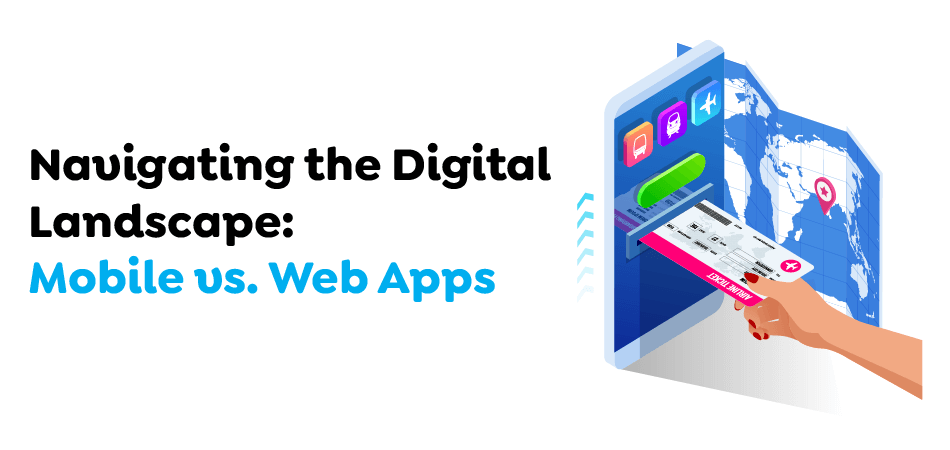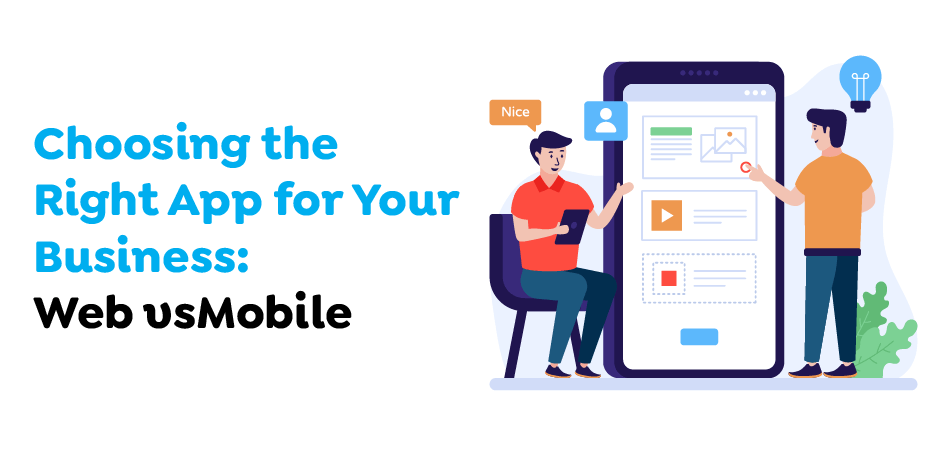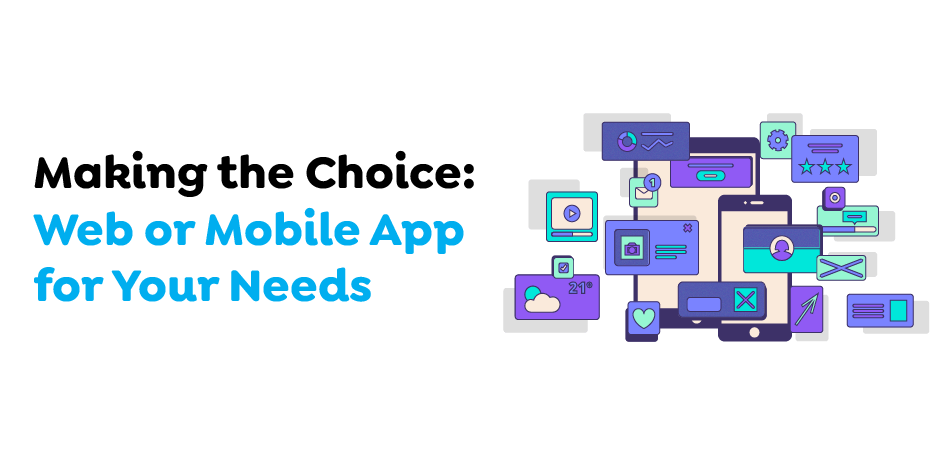Write Us
We are just a call away
[ LET’S TALK AI ]
X
Discover AI-
Powered Solutions
Get ready to explore cutting-edge AI technologies that can transform your workflow!


In the age of digitalization, a solid online existence is vital for companies that want to be successful. Creating mobile and web-based applications is one of the most effective ways to accomplish this. However, the battle lines have changed from offline vs. online to specific platforms, i.e., web app vs. online mobile app. We are a well-known mobile app development company. We constantly push the limits of innovation using the latest technologies.
A 2023 report from Statista estimates that mobile devices affect 85% of web traffic. Of this, 53% is directed to websites and not apps. Although the Internet is accessible to all users and cost-effective development, it does not provide the same interaction. Research has shown that people spend 3 to 4 times more time on mobile apps than on mobile-friendly websites.
Although mobile applications and sites offer unique ways to connect with users, their differences go far beyond simple building techniques. This blog will discuss the importance of mobile and web-based app development services. We’ll also attempt to answer the more important question of what a mobile or web app is.
So, Let’s Begin!

The digital world has many options, and at the heart of it all, it is the most essential choice for businesses, whether to use mobile or web apps. To fully understand the two, we need to dig deeper into the following data:
The mobile app and website data show that as of 2023, the app market is expected to grow to $756 Billion in 2027. This represents a CAGR of 8.58% from 2022 to 2027.
According to the eMarketer report, smartphone users spent an average of 4 hours a day online in 2020, of which 88% were spent on mobile apps.
The 2021 survey revealed that users prefer mobile food apps over websites offering food apps. However, the accessibility of web apps makes them the first choice if you need to reach customers quickly.
The data below shows that most users use a mobile site or app at various times according to their preferences.
Mobile’s future technology is full of possibilities. Knowing its expected growth will prepare us for a world in which the latest technology is more embedded in our lives. Let’s also look at mobile and web apps in isolation.
In the current digital age, deciding whether to use an app for mobile or web-based apps can be an intelligent decision for your company. Both offer unique advantages. Let’s examine the advantages and disadvantages of each.

A mobile app is developed for devices like smartphones or tablets. Depending on your needs and objectives, you may create hybrid or native apps.
Native apps are developed using specific programming languages for the operating system they’ll be running on. They are also designed using standard software development tools required by either Google (if you’re creating an Android app) or Apple (if you’re developing an iOS app).
However, hybrid mobile apps are developed using web-based technologies like HTML5 and JavaScript, which allow them to run on different mobile platforms without altering the code.
This in-depth guide to comparing a native and hybrid app is helpful for a deeper understanding of this topic. In the meantime, we’ll focus on web and mobile applications.
Also Read : Grab the Opportunity to Launch an App Like TikTok With Enhanced Privacy and Features
Access is Easy: One of the most significant advantages of mobile applications is that they can be used offline. Users don’t have to open the Internet to view apps’ features or content, which increases user engagement and retention.
Speed up loading and performance. Mobile apps can also operate faster and perform better than web-based applications. This is because these kinds of apps utilize native code designed to run on a particular device.
Enhance User Experience: Many mobile apps use the built-in capabilities of the user’s device, such as cameras, to provide more excellent capabilities and individualization. They also save data locally, simplifying and offering users the most personalized experience.
Offer Better Security: Offer better security because native mobile apps need app store approval before publishing and are generally more secure and safer than web applications that are more standard. Additionally, the protection provided by app stores may not always be accessible with web-based apps.
The Higher the Barrier to Entry: Native mobile apps have to meet the strict standards of app stores before they can be published. In addition to being able to meet the platform’s security and technical standards, you need to show that your app is of ongoing value. Many app stores charge a fee to promote your app.
Maintain and Update: Unlike web-based apps, mobile apps need constant, user-driven updates to ensure they meet the latest operating system features and perform optimally. Additionally, this is a requirement for the app stores’ approval before publication.
Time-Consuming and Expensive Process: Mobile apps are developed using specific languages for each platform, and native app developers are required to develop separate versions for various platforms, which results in a more lengthy and expensive mobile application development process.

With all the negatives that mobile apps have, is it worth the cost of mobile app?
Definitely!
With over 6.3 billion people using the new realm of smartphones worldwide, mobile apps provide substantial growth opportunities for app creators.
The smartphone app industry is predicted to earn an astounding $613 billion in revenues in 2025.
You must play the game correctly to make the most of your money. This is mostly a matter of two factors.
Begin by reducing the risks by proving your idea using the minimum viable product (MVP). An MVP is an app version with only enough features to satisfy early adopters.
Suppose you start with the tiniest possible version of the product. In that case, you can reduce time and cost by directing resources toward features your intended customers will likely want to utilize. Many MVP examples that were initially slim are now among the world’s most renowned brands.
Then, select an app development company in UK capable of producing outstanding results in less time.
If you’ve learned the basics of mobile applications, we’ll examine the features, benefits, and disadvantages of web-based applications.
Also Read : PoC vs Prototype vs MVP: Which is Right for Your Startup?

Web apps are software applications designed specifically for various platforms and web browsers. Instead of installing locally on a device, web apps operate within the web browser, connecting to data via an Internet connection.
The majority of web applications today are considered progressive web applications (PWS), which run on the web browser but have the same interface elements as their mobile apps. The most well-known examples of PWS include Slack, Facebook, and Viber.
Use Across Different Platforms: Web applications are accessible across various platforms and devices since web pages don’t require downloading to run on other devices.
Faster and Less Expensive to Create: Unlike mobile apps, applications don’t require developers to develop multiple versions of their apps for various operating platforms. Instead, they can develop an app with a single version compatible with all platforms.
Less Memory: Web apps generally require less memory because they don’t reside locally on users’ devices. They are instead accessible via a browser window, which means that users don’t have to be concerned about running out of storage space while they use these apps.
Easy to Maintain and Update: Many web applications can be upgraded without requiring extra effort from users. It is possible to address any bugs or issues by re-updating applications in one step instead of having users download updates individually on various devices.
The Loading Time is Longer than that of a Native Application: The speed and performance of web-based apps depend on the condition of internet connectivity, which means that web app users might experience issues using features of web apps in the event of slow speeds or inconsistency.
Provide Less Sophisticated Features: In contrast to native mobile apps, web-based apps usually do not save information locally. This means that features specific to a device are essential for user experience, and possibly, revenue-generating features might not be available.
Harder to Discover: Unlike mobile apps, web-based applications don’t have to be included in the Apple App Store or Google Play Store. While this might let you bypass the listing process and accelerate the launch process, it could make acquiring users difficult as your app is less noticeable to the millions of weekly app store users worldwide.
Also Read : How To Get Investors For Your Mobile App?

Let’s examine the pros and cons discussed above and compare mobile and web apps.
The most significant differences are in platform compatibility, deployment, and the amount of money required for the system’s construction and maintenance.
Web applications are launched using the mobile browser, whereas mobile apps store their code locally on the user’s device.
A web-based app is easier for new users to access and utilize. Users can click the link or search for it on Google and then begin using it from the beginning.
When using a mobile application, users must be proactive and download it onto their device before they can open it and start using it.
While this can be an area of friction, it can also make applications for mobile devices “stickier,” as they remain on the device until they are removed. The icon for mobile apps remains on the screen that the user uses, and the user can return to the app by simply tapping. Web apps disappear entirely from the device after you close the tab on your browser and depend on users entering the URL once more.
Also Read : How to Hire a Full-Stack Developer in 2025: Best Platforms, Costs & Key Benefits
With internet access, web apps can be utilized on any device and a web browser, unlike mobile apps, which are restricted to specific devices. This could be a benefit or a disadvantage in either case. One way is that it’s an advantage for web-based apps since one code base could serve a larger range of users across more platforms.
However, mobile apps can provide a more immersive and enjoyable experience for mobile devices since they’ve been specifically designed for the platform on which they run. Although web-based apps are more accessible on different platforms, their user experience is hampered because they try to accommodate various types of users.
Web apps are faster and easier to develop than mobile apps. The technology behind web applications is simpler, and several web app development company and development tools exist for building web-based apps.
Development of native mobile apps isn’t as easy as it seems. It takes some time to create mobile apps. Moreover, developers are difficult to find and are paid more. A native mobile application typically costs between 5 and 6 figures to develop, and it requires two distinct designs and teams of developers to launch on two of the most affluent mobile operating platforms (iPhone and Android).
Using hybrid and cross-platform app development cuts the development cost to various extents, sometimes up to 80% or more of the development costs of native applications.
Also Read : Invest Smart: The Ultimate Guide to Crafting Winning Investment Apps

Investing in web app design or app creation for businesses depends on several aspects, including your company’s goals, intended audience, and functional requirements. Here are some tips to help you determine which investment area to make:
Mobile app development is the best option if you require access to areas where the connection between interest and location is a concern. Mobile apps can be used offline, for example, for gaming, maps, language translation, and much more. Web apps typically require internet access.
Regarding offline accessibility, mobile apps are more accessible than web-based apps.
Web application development is the best option for an instant launch since it doesn’t require App Store app approval. A simple web application can take two to four months to develop, which is lower than the mobile app development time, which is 2 to 4 months.
According to the review analysis of 216 reviews submitted over two weeks, the average duration of reviews for an iOS app is four days. Apple can refuse applications if it thinks they contain undesirable elements.
A web-based or hybrid application is a win in terms of speed of development and speedy launch.
Also Read : Make Your Web App Into A Native App Using Hybrid App Development
Web apps will allow you to reach a vast audience. According to Google statistics on traffic to search, 77% of the user traffic is generated by web-based apps, as illustrated by the graph.
Website content can be easily shared via email, social media, or other Internet channels, giving it a greater organic reach. This could drive significant traffic without relying solely on the visibility of the app store.
Developing a web-based app would be best if your company wants to expand its reach.
Web applications depend on the Internet’s connectivity and rendering engineers for browsers. This can result in slow loading times and a less responsive user experience, especially with slower network connections. Web apps generally allow cross-platform app development framework compatibility and easier distribution.
However, mobile apps generally offer higher performance and a smooth user experience. They’re ideal for applications that need intensive processing or instantaneous interactions.
Performance-wise, Mobile apps perform more efficiently than web apps in terms of performance.
App discovery and distribution methods are also essential when selecting the best option between web and mobile apps.
Profit from SEO strategies that improve websites’ visibility on the Internet. Using relevant keywords and content, web applications can draw organic traffic and increase users over time.
Mobile app distribution relies on online stores like Google Play and Apple App Store. Optimization of the App Store (ASO) reviews and ratings affects an app’s visibility.
Specific features or functions for devices are crucial for deciding between web-based apps and mobile applications. Applications that offer live-time navigation and camera functions depend heavily on the device’s hardware, such as GPS or cameras.
Web-based apps are unable to duplicate these functions to the same extent.
If your app requires the device’s capabilities, a native mobile application is a better option. However, technological advances such as HTML5 and Web APIs allow web applications to use devices’ features, including camera and geolocation functions.
Mobile apps are the clear winner regarding the ability to access and use features specific to mobile devices.
Also Read : Doctor Appointment App Like Okadoc: Features, Benefits, and Cost Analysis
The price of creating an effective mobile app is greater than the price of web-based app development. Therefore, consider web-based app development if your budget is less than $15K.
The cost of developing mobile apps starts at $15,000, and a feature-rich application with sophisticated functions can cost upwards of $1,00,000.
However, the typical budget for starting a business in web application development can vary from US$10,000 to $150,000. The cost of development is contingent on various factors, such as the complexity of the product and the particular web application development services used by the company.
If you have a limited budget, invest in web app development instead of mobile app development.
Platform compatibility is another aspect to consider when investing in mobile or web-based apps.
Web applications are compatible with every device that runs the web browser, regardless of operating system or device type, including laptops, desktop computers, tablets, smartphones, and other devices running Windows, macOS, iOS, Android, or other operating systems.
However, mobile apps are developed for specific mobile platforms, such as iOS or Android, that optimize and integrate using native capabilities. Howe is not possible. This limitation hinders compatibility with various platforms.
Overall, web-based apps are the best for compatibility with platforms.
Also Read : Learn the iOS App Development Process: A Step-by-Step Instruction Guide For Beginners

They are essential when creating applications that are designed for iOS or Android. Every platform comes with distinct features, requirements, and expectations. Here are some suggestions for every platform:
Design Guidelines: iOS apps must follow Apple’s Human Interface Guidelines (HIG) to ensure an intuitive and consistent user experience. This includes design elements such as buttons, navigation patterns, and layout.
Programming Language: iOS programs are typically created using Swift and Objective-C programming languages. It is vital to know these languages and Apple’s development frameworks, such as UIKit and SwiftUI.
App Review Process: Apple has stringent guidelines regarding app submission and review. Developers must comply with these guidelines to avoid being removed from the App Store.
Device Fragmentation: Although iOS offers fewer device options than Android, developers must consider different sizes and resolutions for iPhones and iPads.
Material Design: Android app development must follow Google’s Material Design guidelines for consistent visual elements and interactions across various devices. Material Design emphasizes principles like the hierarchy of motion, hierarchy, and reactivity.
Programming Language: A Programming Language Android applications are usually written using Java or Kotlin. Kotlin is gaining popularity because of its simplicity and compatibility with Java.
Separation: Android is used on various devices with different resolutions, sizes, and hardware configurations. Developers need to ensure compatibility and efficiency across these devices.
Distribution Options: Besides the Google Play Store, Android apps can be downloaded from other stores or even sideloaded. Developers should consider the distribution options available in light of their intended market and audience.
Also Read : Let’s Create the Next TikTok Alternative!

Here are some of the most popular mobile and web apps from various sectors:
Amazon: A market leader in Internet retailing, Amazon offers a wide range of goods and an enjoyable shopping experience for online and mobile customers.
WhatsApp: A free messaging app that enables users to send text, voice, and picture messages to individuals or groups in chats.
Also Read : What is the Cost of Building a Messenger App Like Botim? Unveil!
Instagram: Instagram is a famous video-sharing and photo platform that allows users to stay connected with family, friends, and influencers.
Zoom: Zoom is a video-conferencing application that allows users to chat during webinars, meetings, and social interactions.
Also Read : Video Chat App Development Like Zoom; Process, Features, And Cost Estimation!

Deciding between a mobile or a web-based application can be smart for your company. Here’s a summary of the key aspects to take into consideration in making this important decision:
Target Audience: What type of audience are you attempting to engage with? What audience are you trying to connect with? A mobile application may be the best choice if your customers always travel and require GPS and offline connectivity features. Web apps could suffice to reach a broader audience that is comfortable using web browsers.
Functionality: Look at your application’s key aspects. Do users need constant internet connectivity? Or can they utilize device features like cameras? Mobile apps do well in this. However, a web application could be more affordable if you want a static experience focused on information dissemination.
Budget: Developing or maintaining distinct mobile apps on different platforms can be costly. However, A web-based app has a common codebase, making it a cheaper option.
Engagement: Mobile apps can provide push notifications and a more personal experience, which could lead to better user engagement. Web apps can be entertaining but may require more effort to get users back.
Development Time: Creating a web application is quicker than creating separate mobile apps for different platforms. This is important if you must launch your product quickly.

Ultimately, web and mobile app development can be powerful and practical tools for serving your intended users. The best choice is based on your goals and who you want to serve.
Web-based apps are cheaper and faster and can be used by many users with the same development. However, you’ll sacrifice user-friendliness, engagement, and retention, particularly with mobile users.
Mobile apps are much more complicated and require more investment to launch. Moreover, mobile apps developed using a native programming language can only run on one specific platform. Mobile apps perform better than web applications with mobile users and are simpler.
Get in touch with Techugo, a leading mobile app development company, to elevate your digital presence and drive success.
Write Us
sales@techugo.comOr fill this form